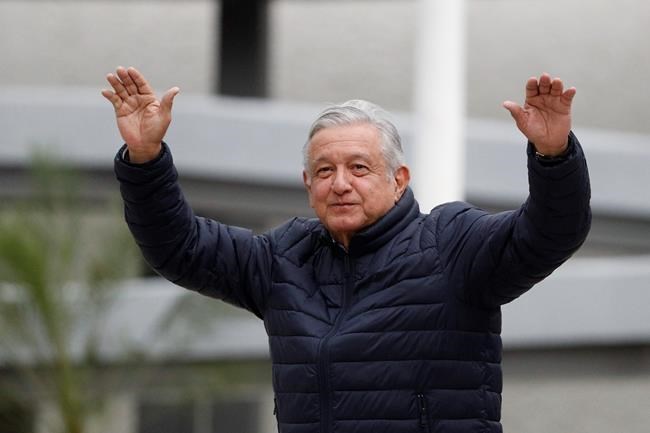
FILE - In this April 3, 2020 file photo, Mexican President Andres Manuel Lopez Obrador waves to supporters at the end of a visit to a Social Security Institute hospital that will be converted to receive patients infected with the new coronavirus, in the Coyoacan borough of Mexico City. Lopez Obrador said Thursday, July 30, 2020, that he is creating a central national purchasing and distribution agency for medicines, vaccines and medical equipment amid persistent shortages during the pandemic and the arrest of a doctor who advised a patient's family to buy their own medications. (AP Photo/Rebecca Blackwell, File)
Republished August 24, 2020 - 4:48 PM
Original Publication Date August 24, 2020 - 4:06 PM
MEXICO CITY - Mexico’s president said Monday the United Nations would be welcome to come to Mexico to investigate any rights violation like the Aug. 24, 2010 massacre of 72 migrants in the northern town of San Fernando.
Speaking on the 10th anniversary of the slaughter of mostly Central American migrants, President Andrés Manuel López Obrador said he has proposed legal changes to make international investigations possible from the start, especially in cases of forced disappearances.
Mexican law currently gives sole power to Mexican prosecutors in such cases. Forced disappearance is when police, military or other public employees kidnap and “disappear” someone.
“We are about to send a bill approved by the executive branch to the Senate ... so that in cases of forced disappearance, in every case that represents a violation of human rights, the U.N. could intervene with no limitations," López Obrador said.
In the 2010 massacre, members of the old Zetas cartel stopped two tractor-trailers carrying dozens of mostly Central American migrants and took them to a ranch in San Fernando, in the Gulf coast border state of Tamaulipas.
After the migrants refused to work for the cartel, they were blindfolded, tied up on the floor and shot dead. One migrant played dead, escaped and alerted authorities, who found 72 corpses at the ranch.
The motive in the massacre may have been the Zetas’ desire to recruit the migrants, but the killers also apparently wanted to discourage migrant traffickers allied with rival gangs from sending migrants through what they considered their turf.
Both Zetas and local police were implicated in the massacre. Activists and relatives have criticized both the handling of the investigation and the bodies of the victims.
So badly handled were the bodies — and so badly decomposed when they were finally handed over to relatives after a long delay — that some still wonder whether the right corpses were given to the right families.
On Monday, Assistant Interior Secretary Alejandro Encinas that Mexico was now offering to help relatives in the victims' home countries exhume those bodies for testing to positively identify them.
In many aspects, Mexico has seen a rebound of bloody events like those that marked the bloodiest period of the country's drug war from 2006 to 2012, including the dumping of bodies on highways, arson attacks, mass killings at parties and beheadings. But since then there has been no other major migrant massacre, and a possible recurrence of that is one of López Obrador's worst fears.
Pope Francis spoke of the anniversary Sunday.
“There were people from various countries who were seeking a better life,’’ Francis said remarks to the public in St. Peter’s Square. “I express my solidarity to the families of the victims, who still today are calling for justice and truth about what happened,’’ the pontiff said. “The Lord will ask for a reckoning for all the migrants who perish in journeys of hope. They were victims of a throw-away culture,’’ Francis concluded.
News from © The Associated Press, 2020